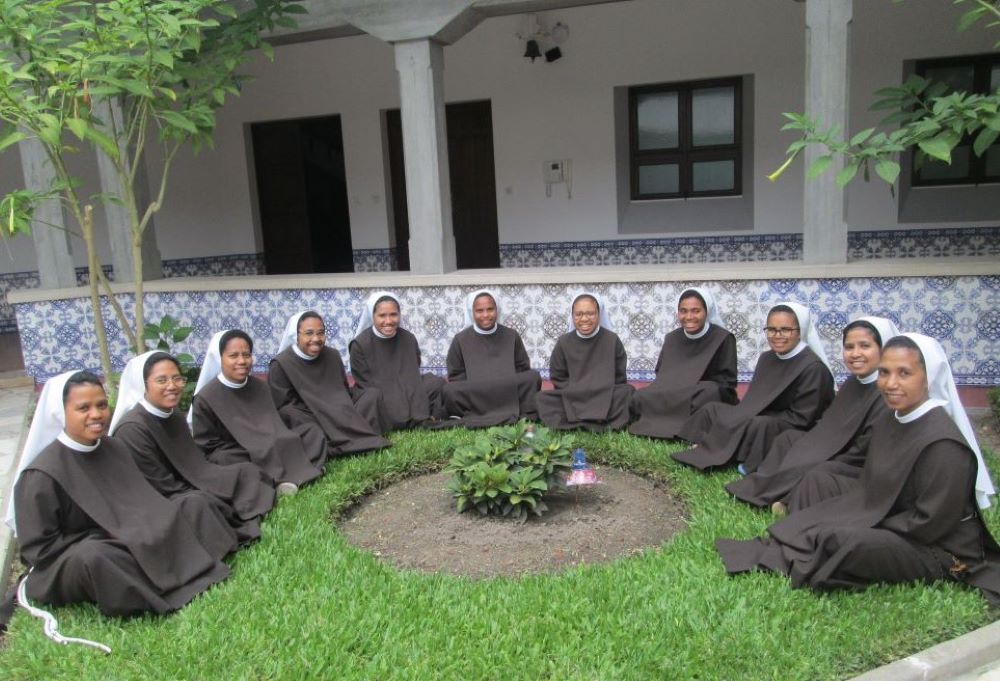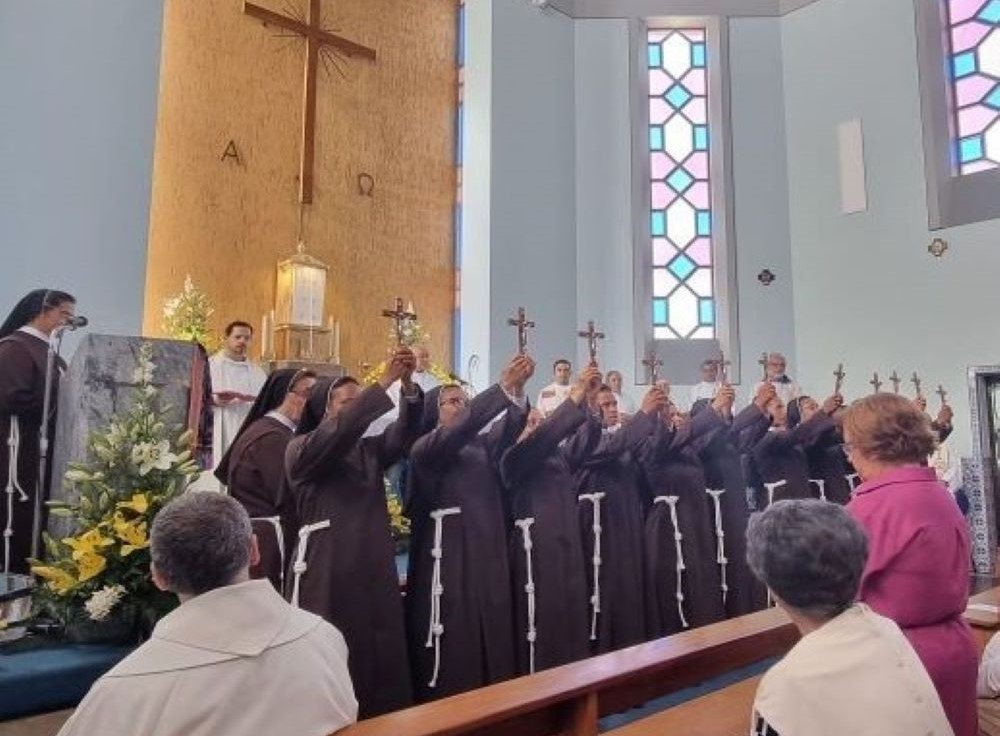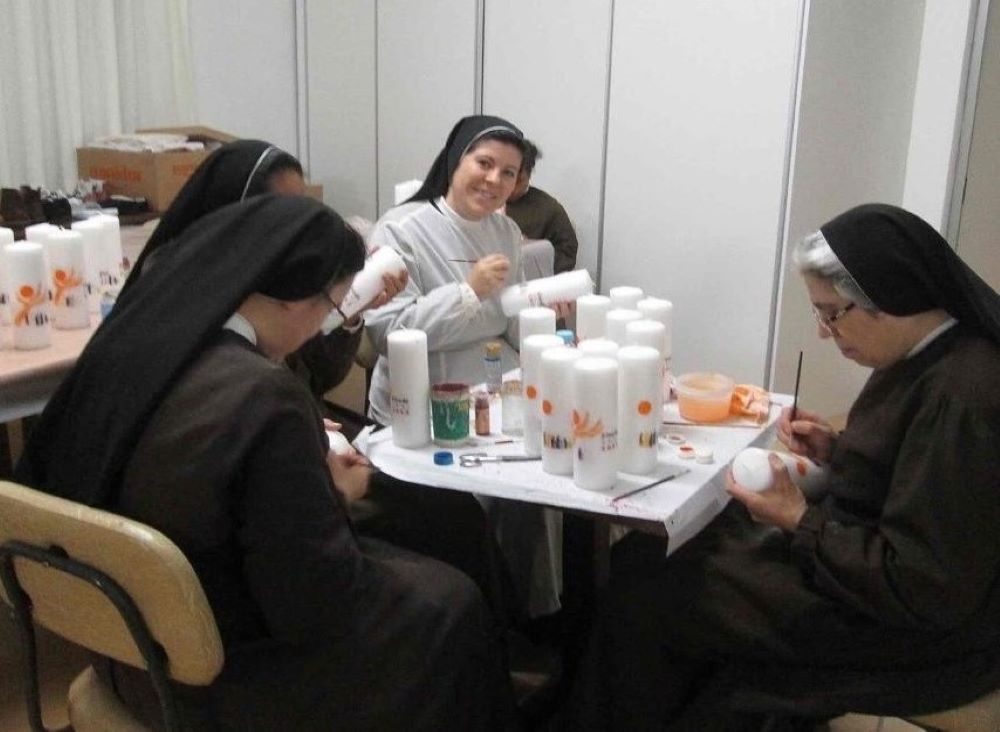
Eleven young women from different regions of East Timor underwent formation at the Monastery of St. Clare in Portugal. They made their first profession of vows on Aug. 11, the feast of St. Clare of Assisi, and will minister to children in East Timor. (Courtesy of the Monastery of St. Clare)
On Aug. 11, the feast of St. Clare of Assisi, 11 young Timorese women made their first religious professions as Poor Clares at the Monastery of St. Clare in Monte Real, Portugal.
"I thank God for my vocation as an intercessor for all people, especially for those who do not believe, do not worship, do not hope and do not love Him," Ana Bela, a native of the Timorese municipality of Manatuto, said in testimony published in July on the website of the Diocese of Leiria-Fatima
"Religious vows are a way of responding with my whole life to the restlessness God has placed in my heart," said Florinda, from the municipality of Ermera. "I seek God's will. Despite my frailty, he trusts me."
The women traveled from the Southeast Asian nation of Timor to the European nation of Portugal because "it seemed more practical for [their] formation to bring them together in formation groups," the abbess, Sister Maria Clara, told Global Sisters Report.
"We chose to bring the girls to Portugal because it would be easier for them to live in a stable community with more sisters and more human resources since there are only four solemnly professed sisters in East Timor, and formation would be almost impossible," she added.
This group of novices will soon return to strengthen the community in East Timor.

Eleven young women from East Timor made their first profession of vows on Aug. 11 at the Monastery of St. Clare in Portugal. (Courtesy of the Monastery of St. Clare)
Portugal and East Timor are united by historical ties, friendship and dialogue. East Timor was a Portuguese territory until 1975. This was followed by Indonesia's occupation period. On Aug. 30, 1999, the population of Timor voted in a referendum in favor of independence. As a result, the territory was placed under the transitional administration of the United Nations. On May 20, 2002, East Timor's independence was formally recognized by Portugal and Indonesia.
With independence, the bond between Portugal and East Timor grew stronger. Various Portuguese Catholic religious congregations and religious communities were invited to open mission houses in East Timor. The church in East Timor in 2011 invited the Monte Real community to set up a contemplative life foundation, and the Monastery of St. Clare of Tunubibi was established in 2016.
"When the monastery was inaugurated in East Timor, we carried out vocation promotion initiatives in parishes and schools, distributing leaflets and holding meetings. There was a very good reception, and several young women had an experience at the monastery, ended up discerning and are still with us. Others came because a priest, a catechist, a friend told them about it," Sister Maria Clara explained.
The monastery "is becoming more and more a place of welcome, spirituality, sharing and learning," she said. "Thanks be to God, a small community with a regular life is already developing there."
The arrival of the Timorese women in Portugal and the Portuguese sisters in East Timor created some intercultural challenges. "We don't fear our diversity, but we value differences and everything that makes us unique in personality, diversity of gifts and cultural aspects that enrich the charism and fraternity," the abbess said.
The countries bring different liturgical music and cuisine, and the climates also are dissimilar. "In Portugal, we have four seasons, with winter sometimes being very cold, a cold unknown to the young women of Timor," the nun said. "In Timor, there are only two seasons, the dry season and the rainy season."

Poor Clare Sisters in Monte Real, Portugal, hand-painted the candles that synod delegates used at the opening of the local phase of the synod on synodality in the Leiria-Fatima Diocese. (Courtesy of Leiria-Fatima Diocese)
Etelvina, a novice from Maubisse, had long wanted to be a religious sister. "When I arrived at the monastery, it was difficult to understand the rhythm of prayer and work, especially adoration," she said in testimony on the website of the Diocese of Leiria-Fatima. "But God gradually showed me the beauty of our simple way of life, where everything belongs to everyone, and there are no differences between us. We share everything in a true fraternity where love overcomes difficulties."
At the beginning of 2024, Sister Maria Clara traveled to East Timor, and a new project began to take shape, highlighting the importance of the nuns' return there. "I realized that there were many children on the streets every day without family or structural support, so close to us," she said. "We wondered what we could do for them, apart from prayer and the casual support, which is never refused to anyone who knocks on the door."
In response, the Poor Clares of East Timor started a project to serve children. It operates in housing containers, where the community lived while the monastery was built. "Later on, we'll see what other conditions we can offer," Sister Maria Clara said.
"The families have embraced the project very well. We have a government support protocol and a commitment to receive children from the three villages in the Diocese of Maliana: Tunubibi, Secar and Manu Aman."
Advertisement
The Poor Clares provide food and transportation for the children and support their education. "On a recent visit, the prime minister of East Timor, Kay Rala Xanana Gusmão, encouraged us to support the learning of Portuguese (which with Tetum is the official language of the country), the acquiring of moral values and training for responsible citizenship," Sister Maria Clara said.
"Both in Monte Real and in Tunubibi, what we seek is the face of God and the fulfilment of his sovereign will, according to the charism and the Rule of the Order of St. Clare," she added.







